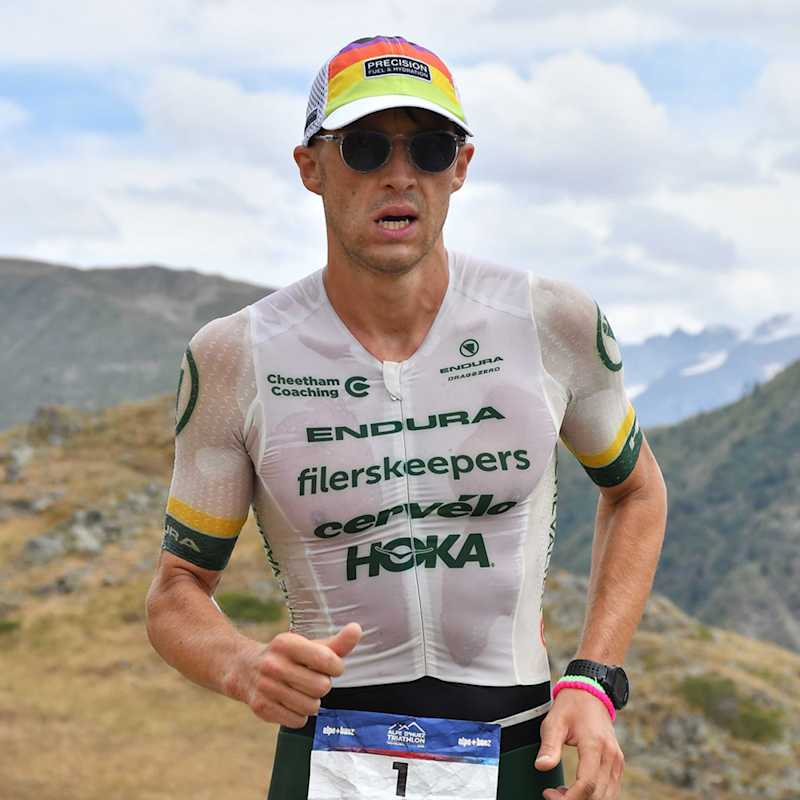
Leon Chevalier
IRONMAN® World Championships
Leon's headline numbers
Leon's strategy
Fueling
Carbohydrate is the main fuel you burn when racing. Failing to fuel properly is a leading cause of underperformance in longer races.
By mixing PF 90 Gels in his aero bottles along with PH 1500 and a little water, Leon was able to maximise carb intake with minimal disruption to his aero position on the bike. He also carried two PF 30 Caffeine Gels, which he tactically timed to have before cycling through Hawi (a large climb) and right at the end with his usual snickers bar eaten, and two additional PF 30 Gels, Leon achieved an impressive average carb intake of ~139g/h while on the bike. On the run, Leon followed his race fueling strategy to the letter, with one PF 30 Gel every 20 minutes, and one cup of coke at the last aid station. This strategy delivered ~80g of carbs per hour to get him round the marathon run in 2:49:28. His total carbohydrate average of 105g per hour was ~10% lower than the previous highest we have analysed from Leon, this level of consumption was therefore fairly comfortable for him to achieve and clearly supportive with a high level of performance.
Hydration
Taking on board an appropriate amount of fluid and sodium is essential to maintaining blood volume and supporting the cardiovascular effort needed to perform on race day.
Whilst the absolute amount of sodium and fluid consumed per hour is important, it’s critical to consider these in relation to each other. This is known as 'relative sodium concentration' and it’s expressed in milligrams per litre (mg/L). How much sodium you’re taking in per litre of fluid is more important than the absolute amount taken in per hour.
Sweat sodium concentration (mg/L) is largely genetically determined and remains relatively stable. Knowing how salty your sweat is enables you to replace a good proportion of your sweat losses, which can range from 200-2,000mg/L.
Given Leon’s losses are High (1,331mg/L), nailing his hydration strategy becomes especially crucial when it’s hot and/or humid.
Learn moreKnowing that the soaring temperatures out on course would combine with extreme humidity to make it ‘feel like’ at least 32°C / 90°F, Leon’s hydration strategy had to reflect the increase in sweat rate he would experience. With this in mind, he ‘super concentrated’ his three premixed bike bottles with seven servings of PH 1500, which he effectively diluted with additional water bottles from aid stations. On the bike, he had an average fluid intake of ~1,669ml per hour, which is 23% more than his previous highest at his l’Alpe d’Huez triathlon in July 2022. Given that Leon didn’t pee throughout the race, this lofty intake doesn’t suggest that he was necessarily overdrinking, although he did report that he would have liked to drink smaller volumes more often to spread this high amount out if this had been feasible on course. During the run, Leon utilised the pro aid stations by picking up three 500ml bottles of PH 1500 and three bottles of plain water. He also reported drinking ~19 cups of water from the standard on course aid stations on course. For someone who has a Sweat Test reading of 1,331mg/L (mg/32oz), we would generally recommend that Leon increase his sodium intake in extreme conditions like this, easily done by carrying Electrolyte Capsules to pair with the extra water he picked up.
Caffeine
Beyond the Three Levers of Performance (carb, sodium and fluid), caffeine is one of only a few substances that is proven to improve performance for most endurance athletes as it can help stave off mental and physical fatigue.
Leon nailed his caffeine intake during the race to reach the recommended intake guidelines and time his doses well in an attempt to increase his perceived energy levels. This included taking a caffeine gel just before the main climb to provide him with an extra boost for one of the races toughest parts.
How Leon hit his numbers
Here's everything that Leon ate and drank on the day...
Leon's weapons of choice
Final thoughts
Leon's full stats
Data Confidence?
There is some confidence in the quantities and brands of products consumed but the data may lack specifics (e.g. volumes specific flavours). A high number of estimations have been made and the room for error is moderate-high. There may also be the possibility that some intake has been grossly over- or under-estimated.